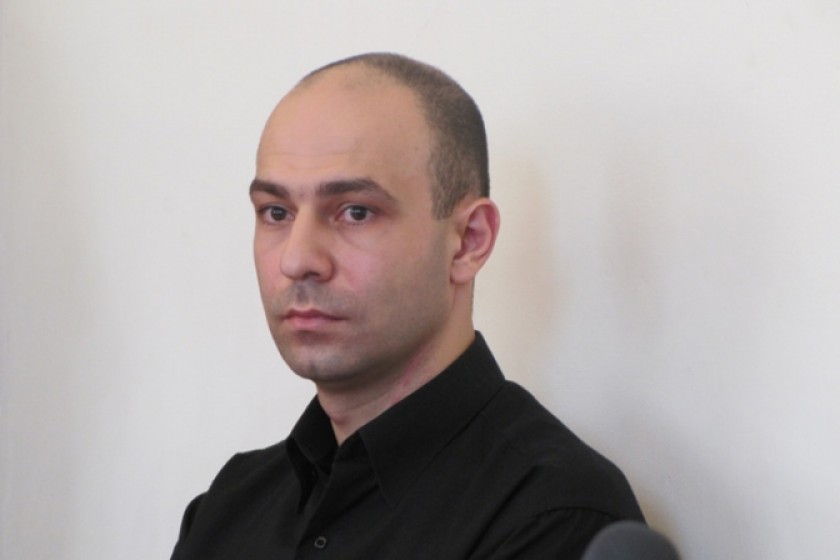
They Punished a Man Who Stole…Blood
By Mher Yenokyan
(For the past year Mher Yenokyan, who has served 19 years of a life sentence, has been writing a weekly article for Hetq from his cell at the Noubarashen Penitentiary)
Nineteen years ago, when I was twenty, I didn’t differentiate between a defense attorney and a prosecutor. I didn’t know their purviews or functions.
I had no clue regarding the criminal code; its articles and penalties. I didn’t know who were kept in our country’s prisons. Worse yet, I didn’t know that there was a place called the “House of Death’, where those serving sentences survived in stone coffins; where relatives brought food and clothing instead of flowers.
In 1996, when they expedited a life sentence against me for a crime I did not commit and took me to death row, I heard a tale about a man who stole blood.
A young inmate told me that in his cell there was an elderly man who had been charged for stealing blood. I had never heard such a bizarre tale. It turns out the man stole the blood to save the life of his grandchild. He didn’t have the money to pay for the blood. But he didn’t steal the money, just the right type of blood. If memory serves, the old man was sentenced to two years.
Nineteen years ago I knew nothing about the concept, in criminal law, known as ‘extreme necessity’. Even then, I thought that one imprison someone for such an act.
I remembered this story when preparing for an exam in my criminal rights class. The textbook frequently provides examples of similar cases and possible resolutions according to the law.
I know now, after reading Article 44 of the RA Criminal Code, that such an exemption from punishment exists.
Here’s the Article verbatim:
Article 44 - Extreme Necessity.
1. Inflicting damage to the interests protected by criminal law in the state of extreme necessity, is not considered a crime, i.e., to eliminate the imminent danger to the life, health, rights and legal interests of the given person or persons, to the interests of the society or the state, if this danger could not be eliminated by other means and no limits of extreme necessity have been exceeded.
2. Willfully inflicted damage obviously disproportionate to the imminent danger, its degree and the considerations of elimination of the danger, when the legally protected interests suffered equal or greater damage compared to the prevented damage, is considered exceeding of extreme necessity.
I ask you. Didn’t the old man in my story commit the act of stealing blood in a situation of ‘extreme necessity’; as a last resort to save the life of his grandchild?
Two questions need to be answered. Wasn’t the life of that child of more value than a few bags of blood? In the eyes of the state, doesn’t the life of a child outweigh that of the stolen blood?
My musings on the concept of ‘extreme necessity’, of self-preservation, and the actions of that old man in the story, amongst others I’ve encountered in my 19 years behind bars, have led to the following conclusions.
- All citizens in Armenia are not equal before the law. This constitutional principle does not operate in our country. There are countless examples to prove this. The most glaring are the killings and skirmishes linked to the Syunik Regional Governor, his son, and relatives. But the Prosecutor labeled these incidents as ‘self-defense. In effect, this state body goes out of its way to find legal loopholes for those of influence. A little old grandfather, who just wanted to save his grandchild, doesn’t get such a break.
During the past few months new revelations regarding the cases of three individuals serving life sentences, including my case, were presented to the Prosecutor General’s Office. Despite knowing about the shortcomings of the judicial system, especially during the 1990s, the office hasn’t taken steps to restore justice to even one unjustly incarcerated inmate. It’s become more than clear that the prosecutor’s office and the courts have no interest at all in restoring justice. Rather, their main task is to see that those enjoying the patronage and favor of the regime escape any responsibility for their actions. Those with no such ties to the regime, even if innocent, are punished to the full extent of the law.
- In the judicial system in Armenia, especially dealing with criminal cases, not only does the principle of ‘equality before the law’ not operate but so too is the principle of ‘punishment proportionality’ overlooked.
- It’s evident that injustice has poisoned almost all sectors in our life.
- It’s evident that all this creates an atmosphere of fear characteristic of authoritarian rule
Struggle remains the exit strategy. Not one step back; always forward.
 Videos
Videos Photos
Photos




Comments (2)
Write a comment